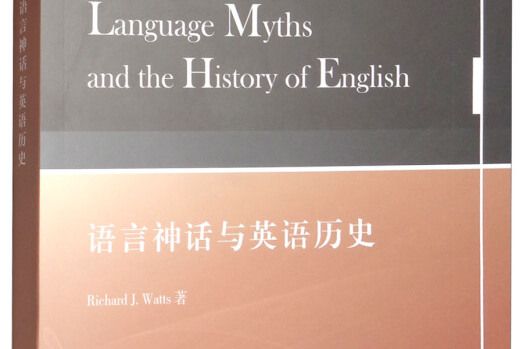《語言神話與英語歷史》是2018年上海外語教育出版社出版的圖書,作者是Richard,J.Watts。
基本介紹
- 書名:語言神話與英語歷史
- 作者:Richard,J.Watts
- 出版社: 上海外語教育出版社
- 出版時間:2018年1月1日
- ISBN:9787544650144
內容簡介,圖書目錄,
內容簡介
社會語言學是研究語言與社會多方面關係的學科,它從社會催嘗詢科學的不同角度,諸如社會學、人類學、民族學、心理學、地理學和歷史學等去考察語言。自20世紀60年代發端以來,社會語言學已經逐漸發展成為語言學研究中的一門重要學科,引發眾多學者的關注和探究。
“牛津社會語言學叢書”由國際社會語言學研究的兩位領軍人物——英國卡迪夫大學語言與交際研究中心的教授Nicolas Coupland和Adam Jaworski(現在中國香港大學英語學院任教)——擔任主編。叢書自2004年由牛津大學出版社陸續出版以來,推出了一系列社會語言學研究的專著,可以說是匯集了這一學科研究的新成果,代表了當今國際社會語言學研究的高水平。
《牛津社會語言學叢書》從中精選出九種,引進出版。所選的這些專著內容廣泛,又較貼近我國學者研究的需求,涵蓋了當今社會語言學的許多重要課題,如語言變體與語言變化、語言權力與文化認同、語言乃匪婆尋多元化與語言邊緣化、語言與族裔、語言與立場(界位)、語言與新媒體、語用學與禮貌、語言與法律以及社會語言學視角下的話語研究等等。其中既有理論研究牛敬,又有方法創新;既有框架分析建構,又有實地考察報告;既體現本犁轎民學科的前沿和縱深,又展現芝良定跨學科的交叉和互補。
相信《牛津社會語言學叢書》的引進套懂愉出版能為從事社會語估挨墓擔言學研究的讀者帶來新的啟示,進一步推動我國語言學研究的發展。
圖書目錄
1. Metaphors, myths, ideologies and archives
1. Defining myths
2. Conceptual metaphors and myths
3. Language myths and conceptual metaphors
4. Foucault's understanding of discourse
5. Discourse archives
6. Myths are the "stuff that ideologies are made on"
7. The structure of the book
2. Establishing a linguistic pedigree
1. The fire at Ashburnham House
2. The myth of the longewty of English
3. Tracing the growth of interest in the Beowu/[manuscript
4. The dating of Beowulf
5. Kiernan's arguments
6. Sociolinguistic arguments in favour of a Danelaw provenance for Beowulf
7. Switching discourse archives
3. Breaking the unbroken tradition
1. Linking two myths
2. Metapragmatic and metadiscursive linguistic expressions and their significance in inscribed ora:lity
3. The Anglo-Saxon Chronicles and the archive they instantiated
4. The breakdown of the archive and inscribed orality
5. The disappearance of the ASC: The end of a discourse archive
4. The construction of a modern myth:Middle English as a creole
1. The creolisation hypothesis
2. The discussion thread "Is English a creole?"
3, The "Middle English is a creole" debate in the academicliterature
4. All language is language in contact
5. Simplification processes not resulting in a creole
6. Creolisation or no creolisation?
5. Barbarians and others
1. The nation-state and the notion of Kultursprache
2. Language versus a language versus the language
3. The"'other" chronicle tradition
4. Myths in the Polychronicon
5. Linking up and extending the myths
6. The central nexus of language myths
6. The myth of "greatness"
1. Introduction
2. Dating the GVS
3. A reappraisal of research work on an elusivephenomenon
4. GVS disputes
5. Challenging the GVS
6. Sociolinguistic aspects of the GVS
7. The myth of greatness reconsidered
7. Reinterpreting Swift's A Proposal for Correcting, Improving and Ascertaining the English Tongue: Challenging an embryonic modern myth
1. Potential new myths
2. The "ideology of the standard language" and the complaint tradition
3. Swift's Proposalas the beginning of a complaint tradition
4. Contcxtualising the Proposa/sociohistorically
5. Alternative readings of Swift's Proposal
6. Swift and after
8. Polishing the myths: The commercial side ofpoliteness
9. Challenging the hegemony of standard English
10. Transforming a myth to save an archive: When polite becomes educated
11. Commodifying English and constructing a new myth
12. Myths, ideologies of English and the funnel view of the history of English
References
Index
7. Switching discourse archives
3. Breaking the unbroken tradition
1. Linking two myths
2. Metapragmatic and metadiscursive linguistic expressions and their significance in inscribed ora:lity
3. The Anglo-Saxon Chronicles and the archive they instantiated
4. The breakdown of the archive and inscribed orality
5. The disappearance of the ASC: The end of a discourse archive
4. The construction of a modern myth:Middle English as a creole
1. The creolisation hypothesis
2. The discussion thread "Is English a creole?"
3, The "Middle English is a creole" debate in the academicliterature
4. All language is language in contact
5. Simplification processes not resulting in a creole
6. Creolisation or no creolisation?
5. Barbarians and others
1. The nation-state and the notion of Kultursprache
2. Language versus a language versus the language
3. The"'other" chronicle tradition
4. Myths in the Polychronicon
5. Linking up and extending the myths
6. The central nexus of language myths
6. The myth of "greatness"
1. Introduction
2. Dating the GVS
3. A reappraisal of research work on an elusivephenomenon
4. GVS disputes
5. Challenging the GVS
6. Sociolinguistic aspects of the GVS
7. The myth of greatness reconsidered
7. Reinterpreting Swift's A Proposal for Correcting, Improving and Ascertaining the English Tongue: Challenging an embryonic modern myth
1. Potential new myths
2. The "ideology of the standard language" and the complaint tradition
3. Swift's Proposalas the beginning of a complaint tradition
4. Contcxtualising the Proposa/sociohistorically
5. Alternative readings of Swift's Proposal
6. Swift and after
8. Polishing the myths: The commercial side ofpoliteness
9. Challenging the hegemony of standard English
10. Transforming a myth to save an archive: When polite becomes educated
11. Commodifying English and constructing a new myth
12. Myths, ideologies of English and the funnel view of the history of English
References
Index

